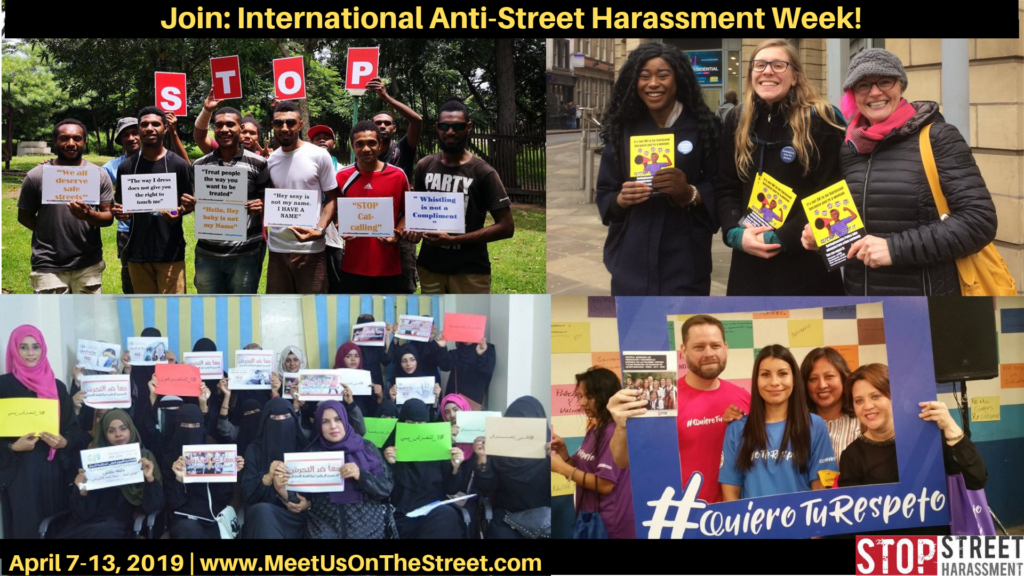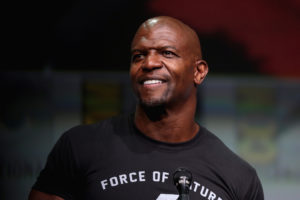Happy 2019, Friends!
We are grateful to everyone who donated to our Giving Tuesday and year-end campaigns. We are putting the funds to use right away and I’m excited to share the following updates with you!
New Research:
We are partnering with UC San Diego’s Center on Gender Equity and Health and the advocacy/research groups RALIANCE and Promundo-US on another national survey about sexual harassment and assault, including street harassment. For the first time, we are asking a question about perpetration and questions about attitudes around reports of sexual harassment. We are also asking a few questions focused on people’s experiences of sexual harassment.
2019 marks five years since our first national study on street harassment. We will create a separate fact sheet highlighting the street harassment-specific findings from this study to provide data, five years later.
We are finalizing the questions with our advisory group this week, and it will go into the field in two waves in February. We hope to release the findings in late March or early April.
Timely Actions:
Yesterday, we joined 200 other organizations in signing a letter to the US Department of Education to voice our opposition to the Notice of Proposed Rulemaking that would amend rules implementing Title IX in a harmful way. (H/T our board member Patrick)
This week, the SSH board of directors issued a statement in support of actor Terry Crews and all male survivors of sexual harassment and assault like him after his experiences were publicly questioned. (H/T our board member Lindsey)
This month, I wrote an article supporting Gillette’s new ad that encourages men to speak up against other male behavior like street harassment. A lot of men were upset about the ad, but I believe we need more ads like it, not fewer.
Sexual abuse / rape like that committed against a woman in Arizona with significant intellectual disabilities is shockingly common. I did a video interview about sexual abuse and persons w/disabilities for NowThis in November, using data from our 2018 research, and they released it this month to give context to this horrific news story.
Transit Campaign
 This week, I joined Collective Action for Safe Spaces’ ED alicia sanchez gill and the marketing team at the Washington Metropolitan Area Transit Authority (WMATA) to discuss the 8th year of our joint anti-sexual harassment campaign. We have a few things we are still fleshing out, but stay tuned for some cool outreach actions and the possibility of a national transit ad campaign!
This week, I joined Collective Action for Safe Spaces’ ED alicia sanchez gill and the marketing team at the Washington Metropolitan Area Transit Authority (WMATA) to discuss the 8th year of our joint anti-sexual harassment campaign. We have a few things we are still fleshing out, but stay tuned for some cool outreach actions and the possibility of a national transit ad campaign!
International Anti-Street Harassment Week
 This year will be our 9th year leading an international week of action, from April 7-13!
This year will be our 9th year leading an international week of action, from April 7-13!
- Here’s information on how to participate!
- If you will be leading action, please complete this form to let us know about it.
- If you’d like to be listed as a participating co-sponsor, please let me know! Contact StopStreetHarassment@Gmail.com.
We look forward to meeting you on the street to raise awareness about street harassment and strategizing ways to end it!
SSH in the News
Recent news coverage includes:
· Guardian
· Isthmus
· KOLO 8
· Newsweek
· New York Daily News
· Now This News
We look forward to working with you all this year on making public places safer for all!
-Holly
Stop Street Harassment Founder & CEO
P.S. Please consider a tax deductible-donation to support our work.


